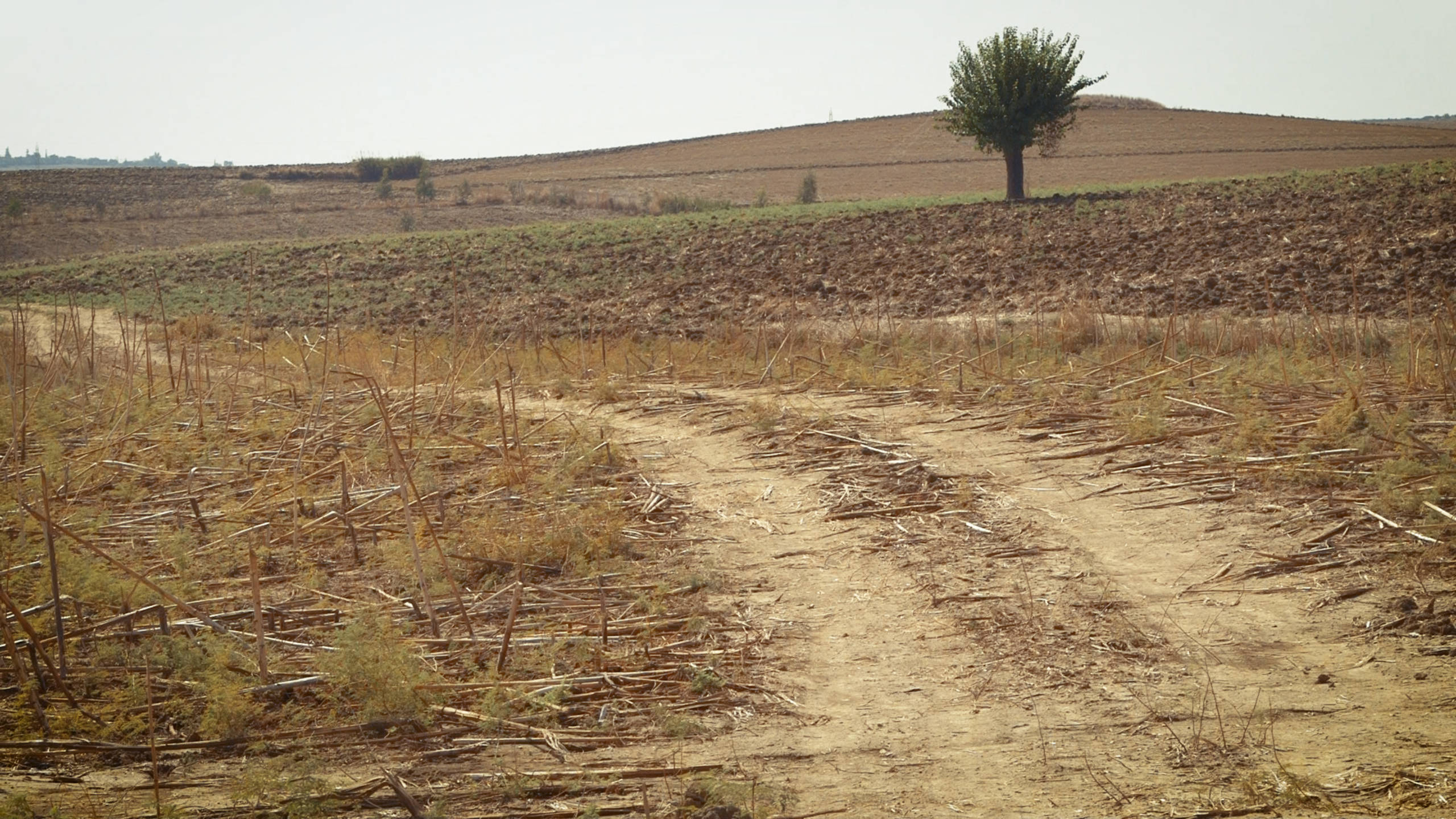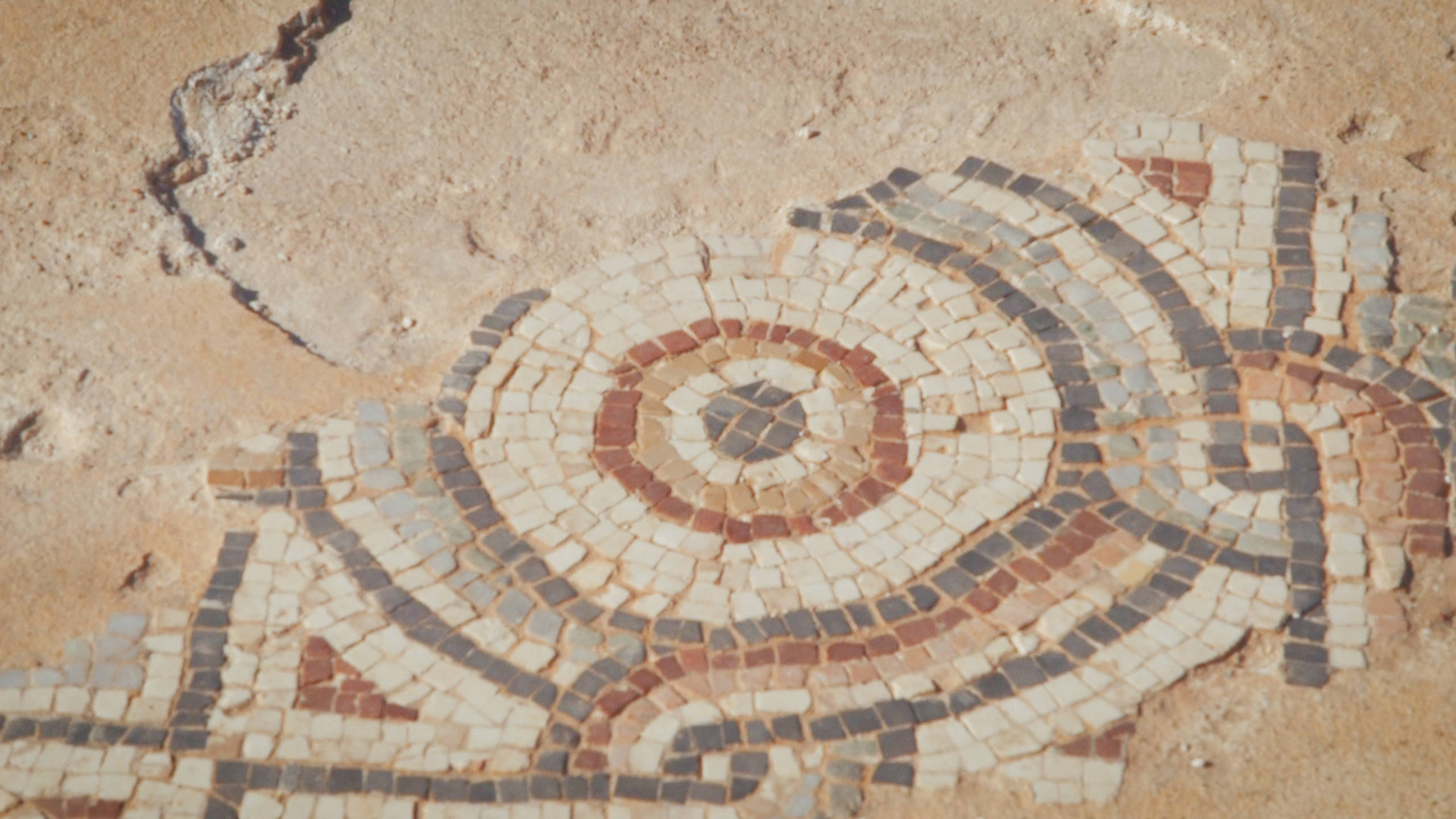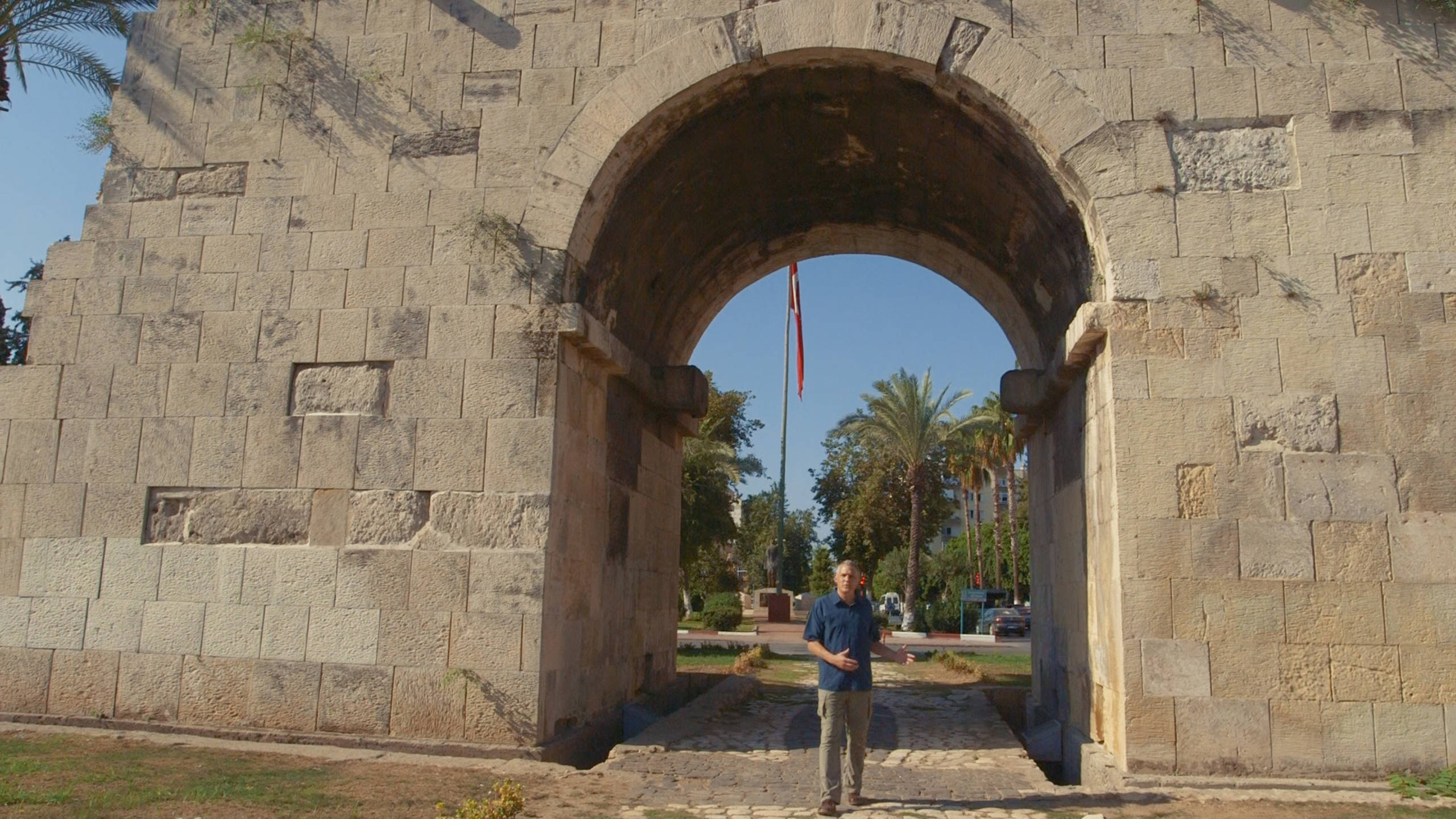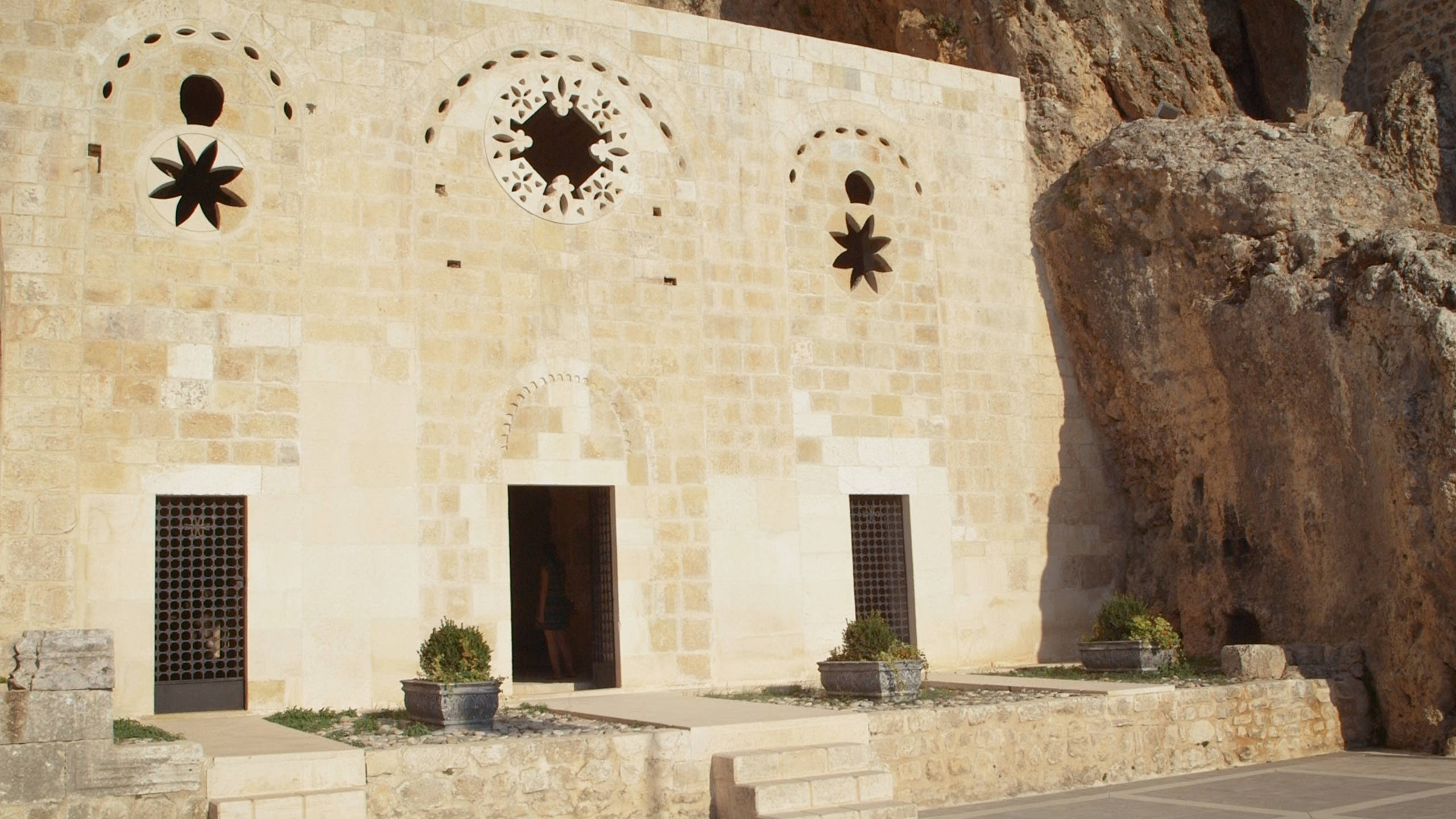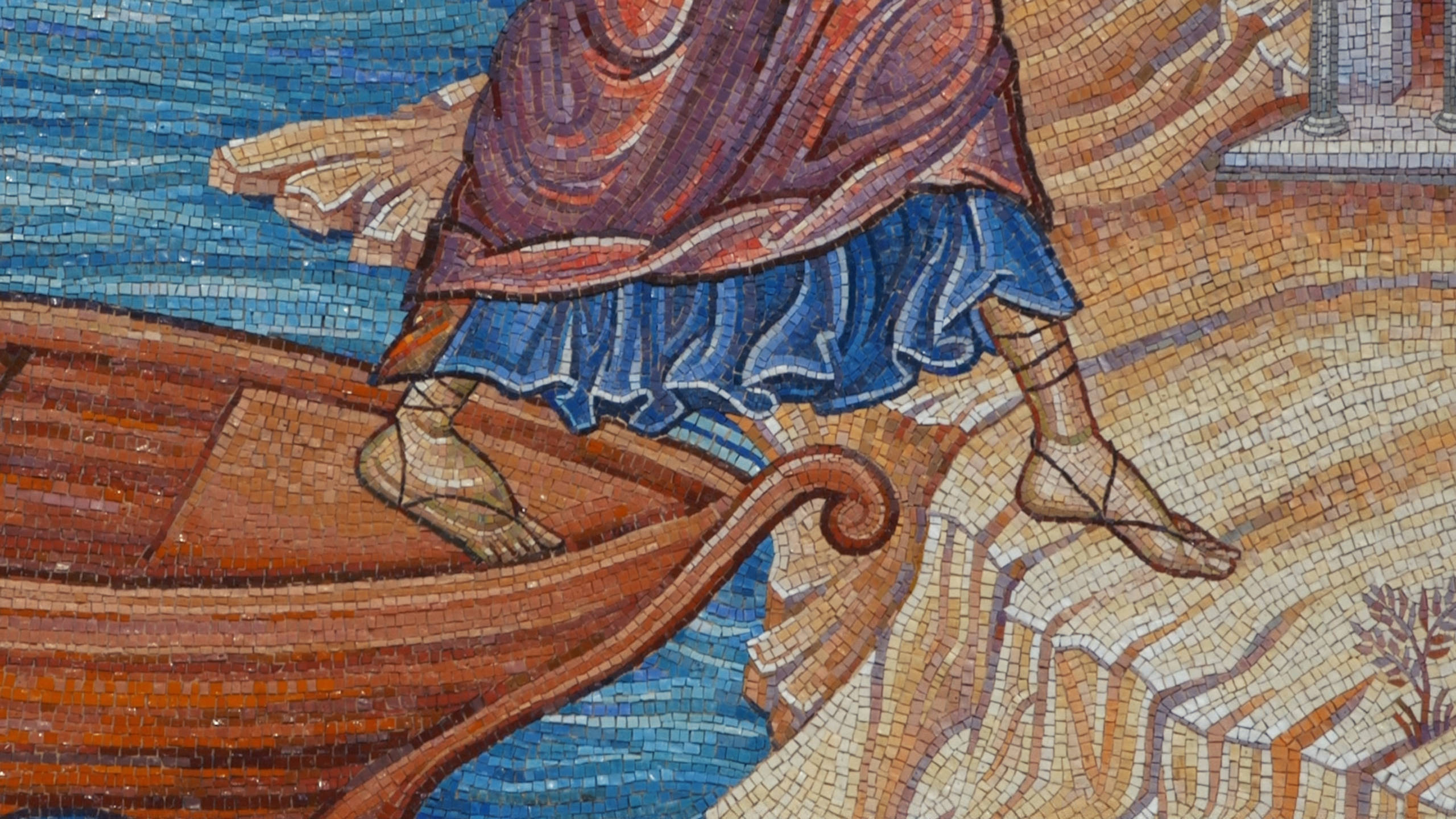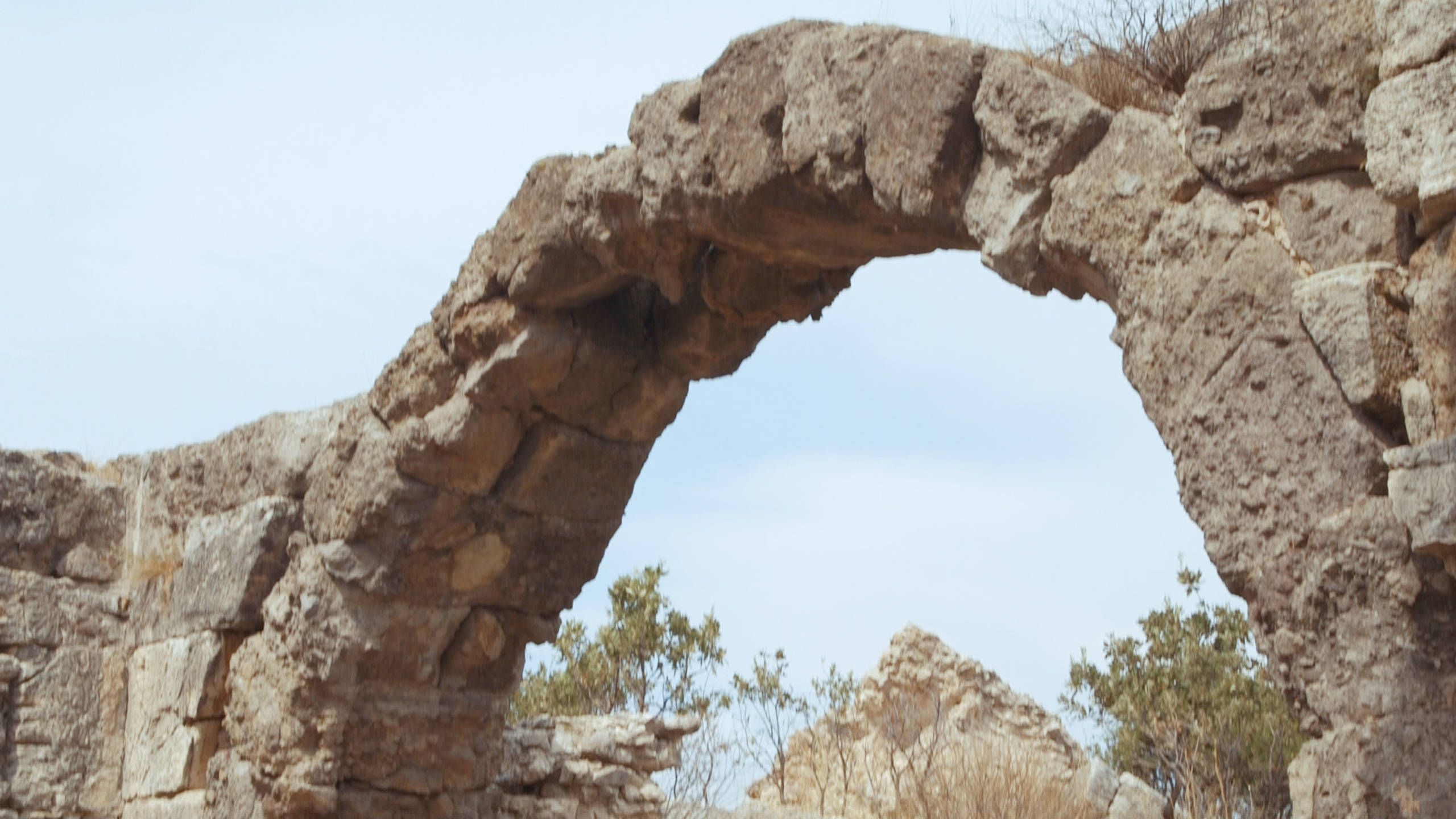“Rediscover the truths that you are wonderfully made, created for purpose, and equipped to live a life of significance. Despite the adversities and detours you will encounter along the way, you can rely on God. Join us as we travel together to find our purpose.”
About the Book
How long are the sessions in each of the series?
We created the age-level guides for 45-minute sessions and included additional material for midweek groups that meet for 60-90 minutes. You can tailor the content to fit your setting. The video sessions for this study are as follows:
- Session 1: “Consulting Your GPS” — 14:05
- Session 2: “Understanding Yourself” — 11:51
- Session 3: “Facing Adversity” — 13:53
- Session 4: “Dealing with Detours” — 9:40
- Session 5: “When You Doubt Yourself” — 11:35
- Session 6: “Tenacity” — 16:07
We’ve never offered small groups before. Is there more help online?
Everything you need is included in the Age-level group guides! For youth and adult leaders, we suggest you read the articles “Starting and Facilitating small groups.” If you’re still a little nervous, sign up for the online eCourse as a group through Upper Room eLearning. If you haven’t taken an eCourse we make it easy for you and your group to learn together!
What do you have for children?
You’ll notice on the CONTENT FOR LEADERS tab a drop-down for Age-level guides. On that page you’ll find the Children’s Group Guide, download the pdf for your children’s facilitators, it contains additional content for planning their sessions.
OK, so what about youth?
Glad you asked! The Youth Group Guide is also on the Age-level guides drop-down, along with the Adult Group Guide. You’ll also find two helpful articles on Starting and Facilitating small groups from our friends at devozine!
How do we prepare facilitators to lead this study?
Everything you need is included in the Age-level group guides posted under the CONTENT FOR LEADERS tab on this website. We suggest you spend some time going through the guide with your facilitators before your groups begin.
What if I Have More Questions?
Contact customer assistance 800.972.0433
Praise for Which Way, Lord?
“Rob Fuquay’s Which Way, Lord? is first and foremost a book of encouragement for those who actively seek a purpose and meaningful direction in life as Christians. It is also a delightfully painless way to learn about the life of Paul, his conversion, his careful listening to Christ before beginning ministry, three missionary trips, and all the challenges Paul faced in being obedient to Christ until the end of his life. Fuquay’s writing is informed by scholarship and at the same time user-friendly with its down-to-earth approach. His humor and use of real-life stories, “servant spotlight” testimonies, make for an engaging read. I commend this book for anyone interested in a deepened understanding of and commitment to following the ways of Jesus.”
-Lallene J. Rector
President, Garrett-Evangelical Theological Seminary
Sermon Starters
Here are some instructions to get you started! Then download the 15 page Word document written by some Upper Room Ministries colleagues.
Before you begin planning worship, we suggest you read the corresponding book chapter, watch the DVD segment, and review the Adult Guide then with your team begin with Sermon Starters!
The flow of the DVD is:
- Rob introduces the session.
- Rob visits significant places for the session and adds commentary.
- Rob wraps up and leaves your group with some thoughts or a question to discuss together.
Instructions for your preparation:
- Read the chapter in the book and review the reflection questions at the end of the chapter.
- Watch the DVD segment for the session—listen for key phrases or words.
- Review the Adult Guide for the session.
- The prayer that Rob uses during the last session is edited and provided here as a downloadable meme to use in groups, worship, and to share on social media.
Consider asking your worship team or adult class leaders to meet to discuss the book and DVD so you can get their perspectives. Hearing other perspectives will make the series richer for everyone.
Think about how to introduce the series in your sermon:
- What does the title of the series means to you personally?
- What do you want to share from your own life experience that is similar or difference than Paul’s?
- What “Servant Spotlights” from your setting would you want to feature? (pgs: 30, 46, 64, 78, 95, 111)
Everyone will get more out of this series if you create a safe space for people to share and hear each other’s stories.
Additional Worship Helps
Worship helps for each week; tailor the content for your setting.
Worship Guide/Bulletin Cover–-download a 4-color image on white (8.5 x 11)
Prayer Meme–download the 4-color jpg to use in worship, with your group, to post on your church website or share on social media. (This prayer has been edited from what you will hear on the last DVD session.)
Sermons
WEEK 1 — Preparing for Purpose
From the Book
“Why are you here?” Rob imagines asking Paul and Paul then asking us. Determining our purpose can seem daunting and perhaps impossible, but this study gives us some tools to help figure it out. In chapter 1, Rob reminds us that we all already know our starting point on the journey toward discovering purpose: God’s love. God’s love is not the goal of faith; its beginning. And we also know where our purpose will lead us: back to God. But knowing the beginning and the end of our journey might not make it any easier to figure out the path to walk. Rob reminds us that we cannot do it alone. We need help to discover our purpose. Paul took years of studying scripture, working out his new theology through preaching, praying and listening for God’s revelation, and growing in understanding of Christian leadership before even beginning to live out his purpose of making disciples of Jesus. For some of us, this discernment process happens in a formal educational setting. I trained in biblical studies and logic in college and in theological studies and through mentoring relationships while in divinity school. Then I spent two years in freelance and temporary positions learning hard skills of editing before beginning my career in Christian publishing in earnest. Many of my fellow students in divinity school are now community organizers, but they took the time away from
organizing to learn about how their faith can and should impact their motivations and spiritual health while seeking justice in various arenas of public life. Others find their spiritual growth toward their purpose away from a formal educational setting. Consider your own periods of greatest spiritual growth and discernment toward your life’s purpose. Where and when have you had these periods? How can you make time in the way you currently live out your call to pay attention to where God might be leading you? How can you make time for growth? Rob offers a plan for creating a personal mission statement on pages 27-29. Consider working through this process and including your personal mission statement in your sermon. And remember Rob’s advice: it should be simple and direct, aspirational, and something lifelong — beyond your job, family status, or other common descriptors that might change. Now, why are you here?
From the DVD
As Rob describes Paul’s change and growth, Rob keeps coming back to the relationships that help us discern and live out our purpose: our relationship with God, with Christ, and with those who advocate for and support us. After Paul’s brief encounter with the risen Christ—the experience that changes him from a persecutor to a follower—Paul spends years building his personal relationship with God through Christ. Do you have a place you can go to listen for God’s guidance? Do you listen through scripture? Prayer? Conversation with other believers? How do you work out what you have heard God saying to you? Paul began to work out his new understanding of God in Christ publicly in Damascus, but he was ill-received. So, he went to Jerusalem. There he needed the help of his friend Barnabas to be taken seriously by Jesus’ followers. When I began a new job, several of my colleagues advocated for my ability both to do the work of the position and to learn quickly the parts of the job I did not already know how to do. Who has advocated for you in your career or in your faith? Consider when you might have the opportunity to be the advocate for friends or colleagues as they follow their purpose. Even after the disciples accept Paul’s call to public ministry, Paul spends over a decade more in Tarsus before beginning to share the love of Christ in the gentile world. Rob explains the value of an extensive period of discernment, learning, and preparation in this way: “More important than the work I do for God is the work God does in me.” Times of learning and discernment make a difference both in understanding our purpose and in the way we live out that purpose. When we take the time to know who we are, the influences in our life, and that we are beloved children of God, we are better able to respond to the call to begin our work when it comes.
Scripture —Ephesians 1:11
The letter to the Ephesians begins much like other Pauline epistles with a brief greeting followed by praise and thanksgiving for God. Embedded within the praise of God, the “Father of our Lord Jesus Christ” (Eph. 1:3, NRSV), is praise of Jesus as the mediator between God and humanity. Ephesians 1:11 asserts not only praise for Christ, but that praising Christ is inevitable. It is part of who we are and part of our purpose. We praise God because God created us and blesses us; we praise Christ because Christ ensures humanity’s relationship with God is one of blessing and praise.
Prayer
God, our guide, help us to know that our purpose comes from you and leads back to you. Grant us the patience to listen and build a stronger relationship with you through Jesus Christ while we take time for discernment. Help us support and advocate for one another as we discover the purpose you have given each of us. Amen.
Benediction
Friends, go in peace knowing that God has a purpose for each of you. Your purpose begins with God’s love and leads back to God. May the love of Christ and the fellowship of your advocates sustain you as you listen to God and discern your purpose. Amen.
—Erin Palmer
Assistant Editor, Upper Room Books
WEEK 2 — Taking Stock
From the Book
Rob invites us in Chapter Two to take a look at our life stories and to take stock of the variety of elements that have shaped us. Rob includes the elements of cultural background, spiritual upbringing, personal life, education and skills, and experiences. At the close of the chapter, Rob emphasizes the importance of rooting all of this assessment in a willingness to serve. A servant’s heart, Rob notes, is key. To get the most from this chapter, I’d suggest inviting your listeners to keep two points in mind as they hear Rob’s invitations for taking stock. First, I find it helpful to recall that each of our stories is part of a grander story, the story of God’s purposes in this world (p. 46-47). Secondly, I find it helps to keep in mind that each of us is a unique creation (mosaic) and deeply loved by God. Paul’s life as recorded in scripture is one piece of God’s grand narrative of redemption. Paul’s story is rich with triumphs and perils, relationships and loneliness, suspense and resolution. Using Paul’s story as an example, it’s clear that no experience, whether success or failure, is without value. The difficult portions of the tale are not shrouded but openly recorded. Even a cursory reading of the genealogy of Jesus in Matthew 1 confirms this pattern—murderers, prostitutes, kings, and lovers are all named in the lineage of Christ, and each is essential to the story. Recognizing each elements of our story as a part of God’s purpose and part of the grand narrative of redemption can be incredibly liberating. There’s no more need to name anything success or failure—it’s all just a part of the unfolding story. Reviewing our background, experiences, and gifts in light of God’s grander narrative invites us to resist comparison and shame. Powerful as well is the practice of viewing our experiences, abilities, and background as design elements employed by a master artist in the co-creation of our life’s narrative. In the DVD, Rob opens the discussion on reviewing life narratives with the metaphor of a mosaic. The elements of each person’s life create intricate designs, much like the pieces in a mosaic together form beautiful images. Invite listeners to view the elements of their lives as design pieces that, with God as co-creator, compose a work of art. Imagining the cultural background, spiritual upbringing, personal life, education and skills, and experiences unique to each of us as beautiful design elements can offer an alternative to our tendency to compare, measure, and judge while taking stock of our experiences. That habit of comparing moves us to judgment—alternately coming up short or self-aggrandizing. What I find so compelling about the narratives of scripture is their readiness to include all, whether an element we’d deem good or bad, meaningful or wasteful, pride-inducing or shame-inducing. It’s all there, all a part of the grander, unfolding story of the far reach of Divine Love. So, as we move into Rob’s invitation to take stock, to review our lives, and to move forward in service to others, let’s do so ready to see the artistry with which we’re designed.
From the DVD
Rob begins this recorded session by referencing an image of a mosaic. He reminds us that humans are works of art, creative compilations of varied elements patterned in distinct designs. Rob goes on to point out three locations in Paul’s journey, each an element in Paul’s own distinct design. Rob focuses on Tarsus, Jerusalem, and Corinth. Paul’s Tarsus represents the geography and culture that shaped Paul’s life. In Jerusalem, Paul experienced both triumph and failure, and God used both in Paul’s life. Paul’s time in Corinth is marked by his instruction on unique spiritual gifts. Rob invites us to name our Tarsus, our Jerusalem, and our Corinth. Take a moment to follow Rob’s instruction. Describe the geography and culture that shaped your life. Recall the experiences that you would name successes or failures in your life and take note of where you see God in these experiences. Note your spiritual gifts, not just your résumébuilding talents, but the gifts you know God uses to grow God’s kingdom. Step back and see the unique design that is you, your ministry, your gift to the world. It’s rare that we take the time to truly listen to our own stories, to be attentive to the many experiences, relationships, and geographies that have crafted us into the distinct works of art that we are. Cultivate a habit of listening to your own story and inviting others to share theirs.
Scripture
Isn’t everything you have and everything you are sheer gifts from God? —1 Corinthians 4:7, (MSG)
This scripture is translated many ways. The NIV says, “Who makes you different from anyone else?” Slightly different, the CEB says, “Who says that you are better than anyone else?” I prefer Eugene Peterson’s version: “Isn’t everything you have and everything you are sheer gift?” (MSG) I like this version because it turns the tables on our propensity to judge—ourselves and others. I read “Who makes you different…?” and “Who says that you are better…?” and hear in the words “different” and “better” inklings of comparison and judgment. I hear in Peterson’s version an invitation to expansive awareness. If indeed what I have and all I am are gift, generously given, my heart opens to give in response. If I am caught in a mindset that compares and judges all I have and am, I tend toward stinginess and constriction. I am gift; I am unique design. I have a distinct part in the grand narrative of Divine Love.
Prayer
Divine Artist, awaken the designer in me. Give me eyes to see each aspect of who I am as a colorful piece of tile in the process of being shaped into a unique and masterful piece of art. Give me eyes to see how this design that is me fits into a larger and wider design full of vitality and love—a design that encompasses us all.
Benediction
Go out with the assurance that you are gift, you are unique design, you have a distinct part in the grand narrative of Divine Love
—Sharon Conley Cottingham
Director of Formational Learning, The Upper Room
WEEK 3 — Facing Adversity
From the Book
The main lesson from chapter 3 is that following God and doing God’s work is not always easy. In fact, it can be quite difficult, creating conflict in relationships and within our own selves. For Paul, following Christ was an unlikely and controversial path. As Saul, he had a reputation for persecuting Christ-followers. Society expected him to behave in certain ways and uphold certain rules. But in his new life, Paul was about being and doing the unexpected. What factored into Paul’s ability to face the adversity of his new life and purpose? In this chapter, Rob gives some suggestions:
It took many years of inward preparation and personal discernment, followed by the encouragement of others (e.g. Barnabas) for Paul to be spurred into action (pg. 53-55).
Paul’s ministry increased as the Christian community opened to accept him and to trust that God was at work through him (pg. 55-57).
When facing pressure from societal norms, surrounded by loud voices of discouragement, Paul and Barnabas stay the course. Even under the threat of physical harm, they remember that the way of Christ is shaped by a cross (pg. 57-59).
Paul recognizes that obedience takes effort (pg. 59), following requires letting God lead (pg. 60-61), and full reliance on God means admitting one’s own weaknesses (pg. 61- 62).
Paul finds opportunity where others might only see obstacle (pg. 63). He trusts that God the Creator can turn conflict and chaos into something good and purposeful (pg. 63-64).
In what ways have you been tempted to follow what others expect, rather than what God calls you to do? When have you faced adversity because you were trying to do the right thing? Have you ever discouraged someone from doing what they felt called to do, because you thought it was not “normal”? Have you ever created obstacles for others?
From the DVD
During a stop in Antioch, the place where followers of Christ were first called “Christians,” Rob explains that saying “yes” to God is not always easy. The people who formed that first church in Antioch came together out of a shared experience of persecution, yet they showed an extraordinary willingness to accept—and even encourage—one of the very people who once persecuted them. With their encouragement, Paul said “yes” to a call, knowing it would not be easy. He sought to live out God’s purpose, despite what people might think, despite chains, and even despite a very real threat of physical harm. Paul and Silas sang joyfully while in prison, and the jailer was moved to follow Christ. God was at work even there. Paul found purpose, “not in spite of adversity,” Rob explains, “but because of it.” Our weaknesses, the conflicts we experience, and any adversity we face can have purpose, when we follow God’s lead.
Scripture — 2 Corinthians 11:24-30, 12:9-10
Isn’t everything you have and everything you are sheer gifts from God? —1 Corinthians 4:7, (MSG)
Read in isolation, 2 Corinthians 11 makes Paul sound like either a boastful jerk or a madman. Seen through another lens, his words hold a message of great encouragement and explanation. Let’s not forget we are reading Paul’s mail when we read his letters to the Corinthians. It’s personal. In this passage, Paul explains to the Corinthians that, while he did not experience everything Jesus’ twelve disciples faced, he endured his own challenges and suffered for the cause. This is one of his I-know-what-I am-talking-about speeches. He seems to say, “I put a lot of sweat and tears into this, and I really do believe this stuff.” He reminds the Corinthians that suffering and facing adversity can be purposeful. Good can come out of it. In fact, God’s power, strength, and amazing grace is often highlighted most when we humbly admit and show our vulnerabilities and true selves. Do you remember studying Greek philosophy in high school history or literature classes? Paul uses a common literary tool found in Greek tragedies; he uses irony to make his point. After all, he is writing to the Greek-speaking and Greek-influenced people of Corinth. Take this paraphrase of Paul’s words: “I am boasting, but ironically, it is about my weaknesses. I am a fool, but ironically, I have great wisdom to share. I have suffered, but ironically, it brings me joy. I am weak, but ironically, it illustrates that God is strong. I might be imperfect, but ironically, God can use me.” The phrase, “God does not give you anything you cannot bear,” is a dangerous and common go-to phrase. Does God create and put the hardships and obstacles in our lives to teach us something? Or rather, is Paul speaking of a Creator God who makes meaning out of mess, life out of chaos? Paul’s words are a reminder that when we give our messiness and true selves, as we are, God can do something with it. We are not called to do or be something unrealistic and other than; we are called to bring our true selves, wholly vulnerable, weak, and imperfect, knowing God will do what is unexpected. This passage also reminds readers that people from whom we expect little, just might be the ones God uses to create the most.
Prayer
Creator God, you formed good out of chaos. Help us to see that you are creating still. Create in us and in the world around us. Help us find opportunity to do good, to love, and to shine your love where others just see obstacles. Help us say, “yes,” when the human standard is “no.” Amen.
Benediction
May the God who brings life out of death, and goodness out of adversity be with you today and every day.
—Marti Williams-Martin
Director of Interpretation, The Upper Room
WEEK 4 — Dealing with Detours
From the Book
In chapter 3, Rob recounts Paul’s unexpected detour from his planned ministry in Bithynia. Instead, Paul traveled to Troas when he was prevented entering Bithynia. Comparing God’s guidance to a GPS which reroutes us to where we actually need to be, Rob reminds us that “God calls us to a purpose before God calls us to a place” (p. 68). We tend to have difficulty with redirection—even when we recognize that it is coming from God. And yet Jesus told us that, “No one who puts a hand to the plow and looks back is fit for the kingdom of God” (Luke 9:62, NRSV). We cannot move forward well and welcome new opportunities if we are constantly looking back, and holding on to what is meant to be in our past. Even if we thought we already knew what God’s plan would be, we cannot allow our idea of God’s plan to interfere with God’s actual plan. We have to be open to taking the sharp left — as and when God encourages. Paul’s story reminds us to focus more on living as who and where God calls us to be, and worry less about making strategic choices and even “wrong turns.” Rob highlights two stories of following God’s “detours” in this chapter. First, when Martin Luther King, Jr. was assigned to Dexter Avenue Baptist Church in Montgomery, Alabama rather than his first choice in Chattanooga, Tennessee, King was in the right place to take the helm of the Civil Rights movement. Second, Rob’s church was force to change their plans for mission work when India was closed to Compassion International just after the mission team visited their planned site. Instead, they sent a team to Uganda. Shortly after meeting their pastors in Uganda, the team discovered that, though they had been planning to donate shoes, God had called them to Uganda to recognize the need for and help to fund huts for children whose parents had died in the AIDS crisis. Each of these acts of faithfulness to the detours God signals demonstrates that God is aware of intersections that we could personally never know or imagine might exist. Rob reminds us that choosing to view detours as a “new opportunity from God” leads us not only to welcome new opportunities, but also helps us to recognize that “a detour simply means we aren’t pursuing the route we originally had in mind” (77).
From the DVD
In the fourth session Rob asks, “Have you ever been in a place that feels like the middle of nowhere, and you’re not sure where to go next?” Rob recounts that because of the work that Paul has done to build a relationship with God, Paul “experiences a divine detour” (Acts 16). He can willingly say yes to God because he recognizes God urging him elsewhere, and trusts God enough to go in this new direction Troas is Pauls’ detour, and he embraces it. What we tend to think are detours—because they are not where we think we should be—are often exactly where God would have us be.
Recognizing Your Detours
Looking back at the detours in your life, what purpose can you now see in them?
What does it mean to keep taking steps when you can no longer go in the direction you wanted?
How might doors of opportunity open through a willingness to help others?
Scripture — Luke 9:57-62
Rob references verse 62 in his writing: “No one who puts a hand to the plow and looks back is fit for the kingdom of God.” However, this entire section of this chapter of Luke is helpful in light of Rob’s discussion on detours. Jesus says to one man, “Follow me,” and the man responds, “Lord, first let me go and…” Another man volunteers to follow Jesus, and adds: “but first let me go back and…” Jesus has provided direction, but we insert our own desires and plans—as well intended and understandable as they may be to us. We insist we must complete them before we can follow God somewhere else. Faithfulness means choosing whose plans we are going to follow—ours, or God’s. It can feel inconvenient and uncomfortable, but it ultimately means trusting that God has greater intentions that what we ourselves could know or create, and embracing the blessing to be part of and receive from that work.
Prayer
Lord, thank you for your guiding spirit and your desire to help us both reach you, and to do our greatest work. Thank you for your love, patience, and peace as we seek to walk with you, and lean into living fully and faithfully with you. May we lift up one another in these gifts as fully as you give them to us.
Benediction
As we go forth, be blessed to walk in the faith and beauty of God, trusting that each of our steps is marking a path toward our greater life together. Amen.
—Joy Bronson
Upper Room Intern, M.Div. Candidate
WEEK 5 — Relying on God
From the Book
In chapter 5, Rob reflects on the times when we face a crisis of insecurity, fear, or self-doubt. He told the story of a mountain climbing experience when he got stuck, doubted himself, and wondered whether he had the strength to take the next move. “Following God’s direction means attempting challenges that can succeed only with God’s help” (p. 85).
Rob gives several suggestions for meeting the challenges of insecurity.
Be a Face Person – Whenever a difficult situation presents itself, face it head on. “God will routinely put us in a place where we must ask ourselves, ‘What am I relying on most right now, my ability or God’s’” (p. 89).
Know Thyself – What kind of personality do you have and what kinds of things trip you up? “In knowing yourself, what tends to make you insecure? Think about the last time you felt that way. In that experience, how could you have practiced reliance on the Holy Spirit?” (p. 91)
Avoid Comparisons – Often, our insecurity drives us to be critical of others. “Comparing ourselves to others is really comparing how we would do in their place. Instead God is calling you to your place” (p. 93).
Obedience First – When we follow where God wants us to go, God uses us in ways we could never imagine. “Last of all, remember that God calls us to be obedient, not successful” (p. 94). Think about a time when you were paralyzed by fear or self-doubt. What are the tools you used to get through the crisis?
From the DVD
In the DVD, Rob visits Athens and Corinth, scenes from Paul’s ministry described beginning in Acts 17:16. Paul took the story of Christ to the Athenians, but he found himself laughed at by those to whom he preached. Thus his arrival in Corinth, he described years later in his letter to the Corinthians, was full of uncertainty about his abilities. Paul wrote that he came “in weakness with great fear and trembling” (1 Cor. 2:3, NIV). Rob says that even when we follow God’s leading, we might come short. But that “Christ does not call us to be successful. Christ calls us to be obedient. We do all we can so that God can do all we can’t” (DVD). Following Christ means that we must depend on God in both our successes and our failures.
Scripture
Rob shares Paul’s words from 1 Corinthians 2:1-5 to help interpret the story of Paul’s failure in Athens. In this scripture, we see the theme of Paul’s ministry that God works through our weaknesses. “But [the Lord] said to me, ‘My grace is sufficient for you, for my power is made perfect in weakness’” (2 Corinthians 12:8, NIV). As you lead the congregation in worship this week, be in prayer for those who are struggling with fear, uncertainty, doubt. Are there stories you can share from your own life or from the lives of the faithful that will bring courage and comfort to those people? How do you address the concerns of those who cannot feel God’s presence in the midst of struggles?
Prayer
God of comfort and strength, we lay before you our insecurities, fears, and self-doubts. We have done our best and still we find ourselves coming short of where we thought we would be. Guide our steps and help us to know that your love is fulfilled through us, flawed and broken that we are. For your power is made perfect in our weakness. In your name we pray. Amen.
Benediction
Go forth in the confidence that God is there beside us in every moment – our successes and our failures. In the name of God the Creator, Christ the Redeemer, and the Spirit who sustains us.
—Beth A. Richardson
Director of Prayer and Upper Room Worship Life, The Upper Room
WEEK 6 — Developing Tenacity
From the Book
As this study draws to a close, Rob offers a critical tool on developing tenacity: When we begin to feel worn in our pursuit of God’s call, remember and revisit our first love—the aspect of our vocation or ministry that answers the question of why we do what we do. Rob’s why is his pastoral relationship with his congregants. Pastoral visits reenergize him to persevere through financial campaigns, administrative work, conflicts, and even sermon writing. Remember your call to Christian leadership. Remind your congregants to look for and return to the why in their pursuit of God’s call. We cannot develop tenacity on our own. It takes a community of people who support us through the tough times and a reliance on God that our work will pay off, even if we never personally see the results. Our spiritual history proves that those who follow God’s call have the spiritual DNA to accomplish what they set out to do. Rob finally shares our suppositions about where and how Paul died, but we do not really know—the Bible never tells us. Paul’s tenacity meant that he was always willing to die in pursuit of spreading the Gospel. Disciples of Jesus Christ were Paul’s why; what’s yours?
From the DVD
In this session, Rob takes us to sites in Ephesus, Caesarea, and Jerusalem where Paul faced resistance that required great tenacity. Rob also lays out how one develops tenacity: it begins with a passion that ignites a purpose; it is maintained by something more than believing in a cause; and it is done in community with the support of those who keep you going. Paul lived out his purpose by finding his passion to share the gospel of Jesus Christ, through faith in God’s presence, and in the company of companions like Barnabas, Silas, Timothy, and others. The foundational question of tenacity is this: What (or who) keeps you from giving up, especially when your passion for your purpose does not seem to be enough? Paul had friends in the faith. In our lives “friends in the faith” do not have to be only Christians. Friends who support your Christian faith are crucial in developing tenacity, but they do not have to be the only ones. If your purpose is in community organizing, “friends in the faith” may be organizers in your location who work in a different arena of public life or a network of organizers on the same issues across the country or around the world. As someone committed to interfaith dialogue, some of my “friends in the faith” practice other religions, and though we do not share a religion, we share a commitment to working toward a world where people of different religious faiths can love and respect one another despite their differences. Who in your support system keeps you going because of your compatible purposes? Who keeps you going because of shared Christian faith? Who keeps you going because they believe in you personally and in your tenacious ability to fulfill your purpose?
Scripture
“[God] will also strengthen you to the end.” —1 Corinthians 1:8 (NRSV)
Like all the letters we know to have been written by Paul himself, Paul’s first letter to the church at Corinth begins with greeting and thanksgiving. Paul give thanks for the church at Corinth and for God’s faithfulness. Paul assures the Corinthians that what God has started, God will finish. God has given them grace, knowledge, and spiritual gifts through Jesus Christ, so God will strengthen them throughout their lives. This promise holds true for us as well and can help us develop the tenacity to fulfill our purpose: God will be with us always, because God has called us to the work of pursuing our passions toward our purpose in life.
Prayer
Lord, when we begin to feel worn out, remind us of our first love. Help us turn to you and your abundant strength and to seek the support of our friends in the faith. Amen.
Benediction
Friends, go in peace knowing that God gives you the strength to pursue your passion with tenacity. Support and rely upon one another as you seek God’s purpose for your life. May the love of God and the fellowship of friends in the faith bless you today and every day. Amen.
—Erin Palmer
Assistant Editor, Upper Room Books
Age-Level Guides
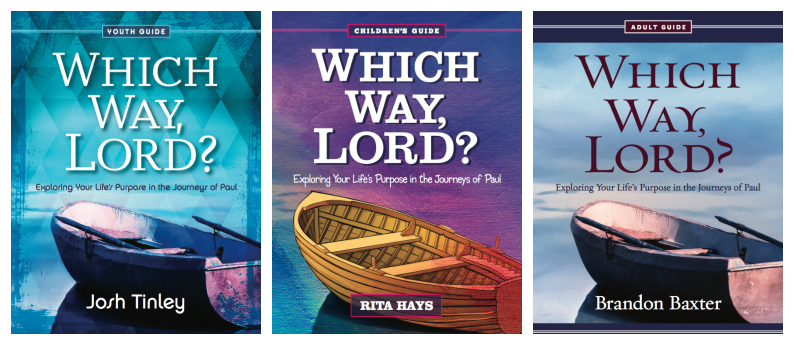
Each age-level guide has 6-sessions to use in planning for your group or for churchwide use!
Youth Guide — This pdf is 56 total pages and has everything you need to plan six sessions for youth. Download or send the link to your youth facilitators.
Children’s guide — This pdf is 65 total pages it includes six complete session plans, download or send the link to the pdf to your children’s facilitators.
Adult Guide — This pdf is 39 total pages and has everything you need to plan six sessions for an adult small group or Sunday school. Download or send the link to your adult facilitators, the guide includes suggestions on using the DVD with your group.
Planning
Tools to promote this series inside your church and out in your community!
Begin by watching the Promotional Video, share it with your small group facilitators or teachers to help introduce the series as you begin planning (this is a 2-minute video).
Click on any of the pieces below to view, right click and download to use:
Church Promotional Copy
Email header
Email header jpg
Facebook cover no wording jpg
Facebook cover jpg
Which Way, Lord? Invitational Video this 1-minute video can be used on your church website, linked in your eNewsletter, or posted on your social media.
Which Way, Lord? Promotional Video this is a longer video that explains this series in detail (2-minutes).
Worship helps for each week; tailor the content for your setting.
Sermon Starters— Read the Sermon Starters above to get you started. Then download the Sermon Starters (LINK to come) written by Upper Room Ministries staff. [Note: during session 3 you might plan a Baptism Renewal worship service.]
Worship Guide/Bulletin Cover–download a 4-color image on white (8.5 x 11 inches)
Worship Prayer–download the 4-color jpg to use in worship during the series.
Key Elements
Key Elements for a Life of Purpose and Meaning
(Chapter 2, p. 37)
Think about what key elements you already know about Paul from what you learned in church or from reading chapter two in the book. Jot down those details in the second column.
Pause for prayer (adapted from the Adult Guide, p. 10)
Creator God, thank you for the gift of life. You have fearfully and wonderfully made me in your image. Reveal to me those aspects of my being that you might use to accomplish your purpose through me. Help me remember whose I am so that I might understand who I am. In the name of Jesus Christ, I pray. Amen.
Now, begin thinking about your key elements and write those in the third column.
*Page numbers from the book are given for each of the key elements if you need a definition
| Key element | Paul’s life | My life |
| Cultural background (p. 38) |
||
| Spiritual upbringing (p. 39) | ||
| Family’s background (p. 40) |
||
| Personal life (p. 40) |
||
| Education, skills, mentors including trade (p. 41) |
||
| Gifts, talents, and skills. Natural abilities (p. 42) |
||
| Experiences (p. 43) |
Download a printable PDF here to use with your small group.
Gifts, Passions, and Style
Gifts
“Gifts represent the traits and abilities God places in people to benefit others.”
(Chapter 2, p. 44)
What traits and abilities do you believe God has placed within you?
(See Romans 12 and 1 Corinthians 12 for more on what Paul said about this.)
List some tasks you’ve completed over the last week.
Rob writes, “You realize you are living out of your gifts when tasks that employ these natural abilities give you energy rather than drain you.” (Chapter 2, p. 45)
Think about what you’ve listed above; then mark through the ones that leave you feeling drained.
Passions
“Passions involve what stirs your soul. What topic or interest could you stay up all night talking about? What problem or ill in our world fires you up and makes you say, ‘This cannot continue!’” (Chapter 2, p. 45)
Think about those two questions for a moment; then jot some thoughts down below.
Style
Style is the way we work and accomplish tasks, which can either help or hinder our ability to work with joy. (p. 45 Which Way, Lord?)
Circle the ways you enjoy working below (add your own):
Alone Teams Dream/Vision Implementation Mental tasks Physical tasks
Think about other aspects of completing tasks that help or hinder you and jot them below.
Pause for prayer: Sit quietly for a moment, thinking about this exercise and what you’ve learned about yourself. When you are ready, talk to God about what you’ve written.
Download this PDF to use with your small group.
Additional Content
The content posted here is for additional activities that your group or individuals can use for additional reflection and journalling. Page numbers refer to the regular or enlarged print book.
Personal Mission Statement (Chapter 2, p. 27)
Key Elements (Chapter 2, p. 37)
Gifts, Passions, Style (Chapter 2, p. 44)
Discovering Your Spiritual Gifts (p. 64)
Discovering Your Spiritual Gifts by Craig Kennet Miller, Director of Congregational Development at Discipleship Ministries. This PDF is 19 pages long and more appropriate for adults. You will find on page 17 and 18 provide a list of additional resources.
In the Youth Guide written by Josh Tinley p. 18-19 you’ll find a spiritual gifts inventory for youth.
“LIVING IN GOD’S PRESENCE: THE PRAYER OF EXAMEN” from devozine.
Read The Examen on UpperRoom.org.
Go and Do
Go and Do
Go and Do will help your church or small group consider ways to serve during your study of Which Way, Lord? The list below highlights the missional work of some of the “Servant Spotlights” featured at the end of each chapter of Rob’s book. Our hope is that you’ll be intentional about planning ways you can serve in your community now and after your study ends!
A faith-based nonprofit organization in Indianapolis, Indiana, that reaches out to homeless young men and women (14-24 years old) with the compassion of Jesus Christ. The goal is to equip and empower at-risk young people to achieve stability and life transformation.
https://outreachindiana.org/about-us/

Indianapolis Ten Point Coalition–Rev. Charles Harrison
The goal is to reduce violence and homicide through direct engagement, the promotion of education, and the fostering of employment opportunities.
https://www.indytenpoint.com/about-us

Solace for the Children–Patsy Wilson
The mission is to build peace on a foundation of health by establishing international partnerships providing medical care, education, and leadership development for the children of war-torn countries.
http://solaceforthecildren.org/

Sisters of st. Antoine–Sister Simone Marie Achille
The mission is to bring God’s word to the poor of rural Haiti through prayer and direct service. The Sisters receive guidance from Father Joseph Philippe, co-founder and spiritual director.
http://www.apfhaiti.org/programs/the-school-of-st-antoine/




